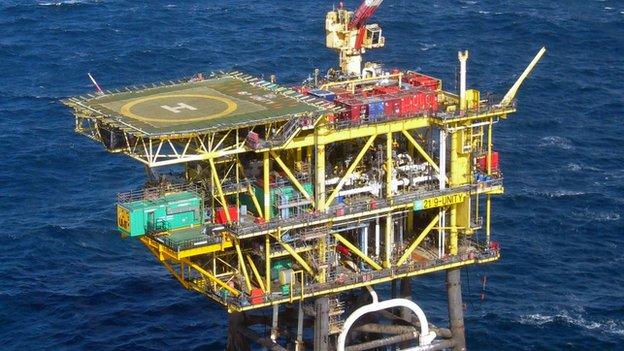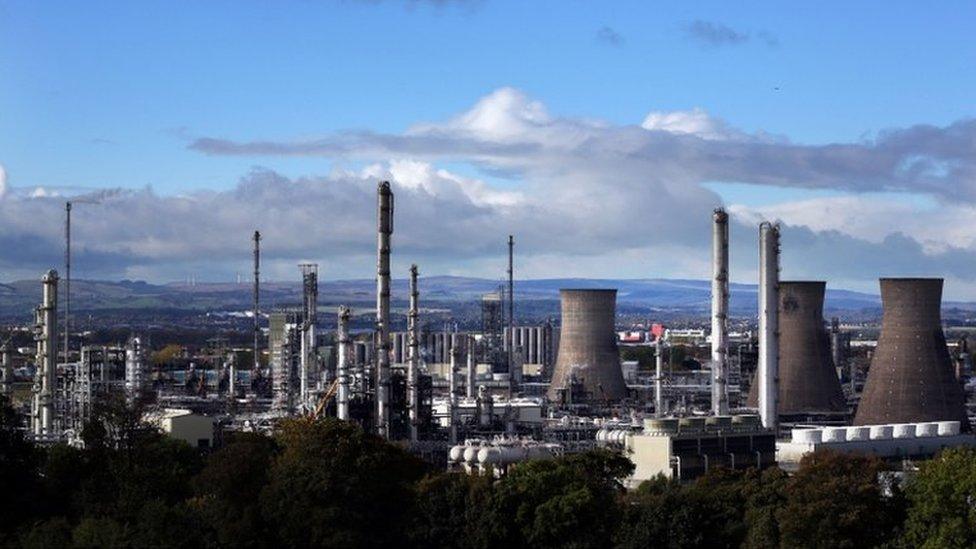BP sells Forties North Sea pipeline to Ineos
- Published

The offshore part of the pipeline runs from the Forties Unity platform to Cruden Bay
Energy giant Ineos has struck a deal to acquire the Forties Pipeline System in the North Sea from BP for US$250m (£199m).
The pipeline transports about 450,000 barrels of oil per day on average - about 40% of UK production.
It is one of the oldest in the sector, having started operating in the Forties field in 1975.
The 235-mile line links 85 North Sea oil and gas fields to the UK mainland, and to the Ineos site in Grangemouth.
Sites at Aberdeen, the Kinneil terminal and gas processing plant, the Dalmeny terminal and the Forties Unity Platform will all transfer to Ineos when the deal is completed.
Track record
BP originally operated the Forties oil and gas field, the pipeline and the refinery.
It sold its interests in the oil field to Apache in 2003 and sold the Grangemouth refinery and chemical plants to Ineos in 2005.
Forties Pipeline System employs about 300 staff at Kinneil, Falkirk, Dalmeny, Aberdeen and offshore.
Ineos chairman and founder Jim Ratcliffe said: "The North Sea continues to present new opportunities for Ineos.
"The Forties Pipeline System is a UK strategic asset and was originally designed to work together to feed the Grangemouth refinery and petrochemical facilities.
"We have a strong track record of acquiring non-core assets and improving their efficiency and reliability, securing long-term employment and investment."

Analysis by Douglas Fraser
Business and Economy Editor, Scotland

Deals done in the offshore oil industry are, generally, a good sign.
They signal that there are still buyers who think they can get more value than existing owners out of these maturing assets, and still have enough left over to pay for decommissioning.
That releases capital for the existing owner to invest upstream.
Following its Gulf of Mexico explosion and spill, BP hastened the pace of its shift from refining and mid-stream operations such as pipelines operations.
The oil major wants to deploy its capital resources where it thinks it can get most return by specialising in what it does best - big scale, technically-demanding new fields, such as those west of Shetland.
Ineos thinks it can extract more economic value out of older assets being put on the market by the majors.
Read more from Douglas.

Under the terms of the deal, Ineos will pay BP US$125m (£99.5m) on completion and an earn-out arrangement over seven years that totals up to a further US$125m.
BP chief executive Bob Dudley said: "While the Forties pipeline had great significance in BP's history, our business here is now centred around our major offshore interests west of Shetland and in the Central North Sea."
'This sale is bad'
The Forties Pipeline System primarily comprises a 105-mile (169km) 36in pipeline from the unmanned offshore Forties Unity platform to the onshore terminal at Cruden Bay in Aberdeenshire.
From there, a 36in onshore pipeline transports the oil 130 miles (209km) south to the Kinneil facilities, adjacent to the Ineos-owned Grangemouth refinery and chemical plant on the Forth.
This is where it is processed before either being sent for export via the Dalmeny terminal or on to the refinery at Grangemouth.

The pipeline carries oil to facilities adjacent to the Ineos-owned Grangemouth refinery and chemical plant
20% of the oil that passes down the pipeline feeds the Ineos refinery to provide 80% of Scotland's fuel.
The Unite union, which was involved in two major disputes with Ineos in 2008 and 2013, called for the Scottish and Westminster parliaments to carry out urgent inquiries into the sale.
Scottish secretary Pat Rafferty said: "It's not so long ago that both Grangemouth and the Forties pipeline were owned by all of us, and operated by a nationalised British Petroleum with a responsibility to look at what was good for the country as a whole, not just what was good for a small group of wealthy individuals.
"Both these parts of vital national infrastructure - which are central to the success of the Scottish and wider UK economy are now essentially in the hands of one man.
"Unite firmly believes that this sale is bad for Scotland and the UK."